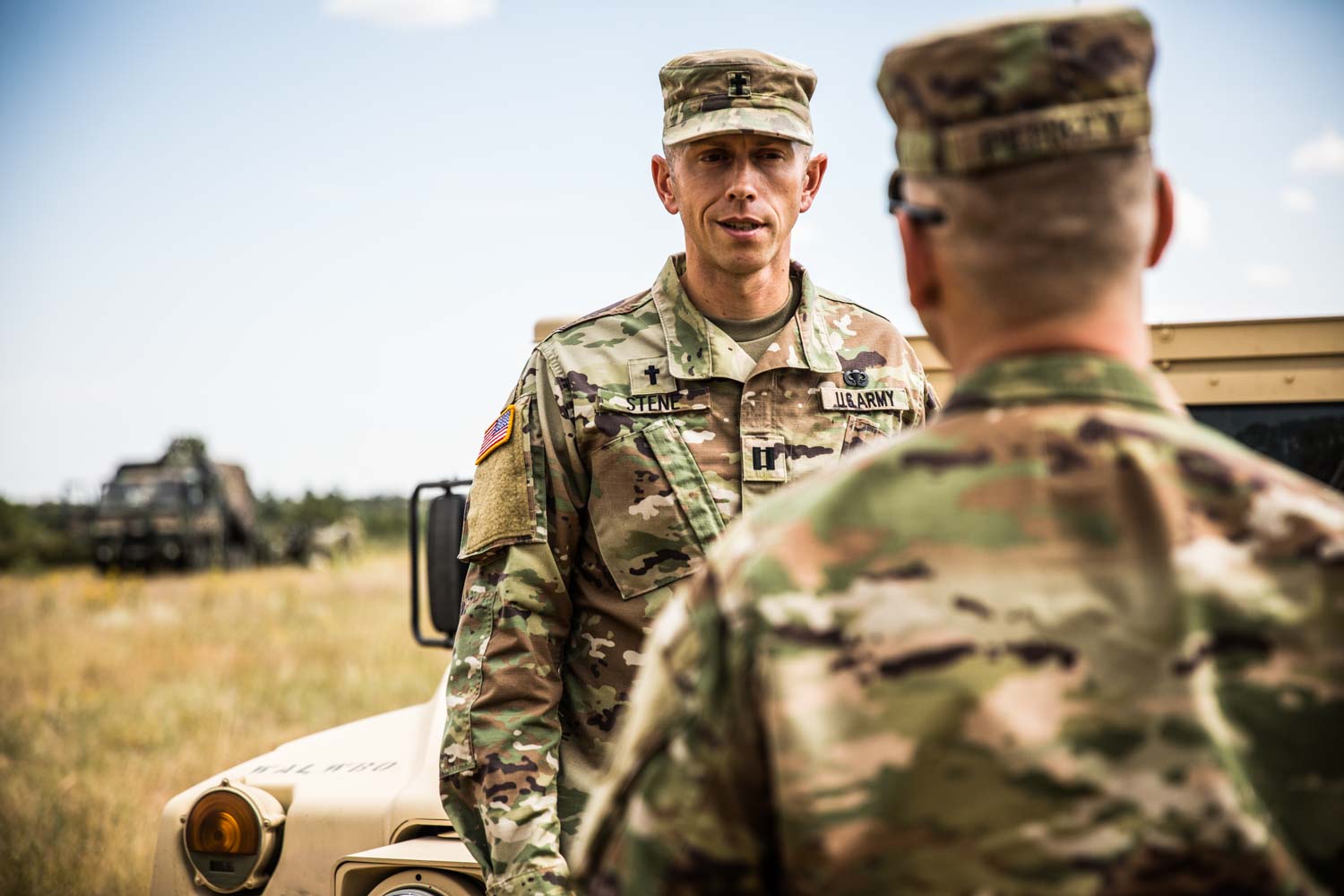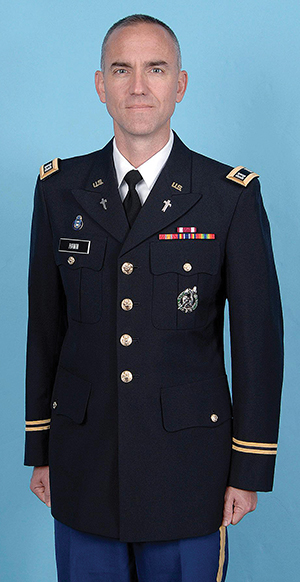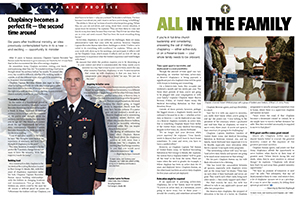
Chaplain (Captain) Dennis Stene speaks with a Soldier. (Official U.S. Army Photo)
Six years after traditional ministry, an idea previously contemplated turns in to a new — and exciting — opportunity to minister


United States Army 1st Medical Recruiting Battalion
Fort George G. Meade, Md.
After 10 years in human resources, Chaplain Captain Recruiter Ted Hamm made the decision to go to seminary in Charlotte, N.C. It was there that he first encountered the idea of becoming a chaplain.
He remembers Army Chaplain recruiters visiting over lunch and explaining what they did. “It sounded exciting; I had never thought about the military before,” he recalls. “It seemed like every day would be different, whether it be working inside or outside, or all the different types of people I’d be ministering to. It seemed very interesting.”
Chaplain Captain Recruiter Hamm was eager to share what he had learned with his wife, who was pregnant with their third child at the time. When they decided that it wasn’t the right time with another child on the way, Hamm pursued church ministry work for six years in Florida.
“I needed a change”
In the midst of a transitional period in his traditional ministry, Chaplain Captain Recruiter Hamm says he realized he needed a break. A friend happened to mention military service to him with the comment of, “If you’ve ever thought about the military, you better hurry; they only take you to age 42.” The friend was correct about the age requirements for active duty; consequently, Chaplain Captain Recruiter Hamm had to move quickly in his decision-making.
“I was 41 and a few months at the time,” he says. “My thoughts went back to my experience at seminary, and how I had thought of chaplaincy in the past.”
This time, however, it seemed to be the perfect fit: “I needed a change but did not want to leave the ministry. With full support, I made the jump.”
Building trust
As a current active-duty chaplain in the 1st Medical Recruiting Battalion located in Fort George G. Meade, Md., with five years of chaplaincy experience under his belt, Chaplain Captain Recruiter Hamm enjoys building relationships with the Soldiers in changing locations and circumstances. “You go where the Soldiers are, which could be the most far-off, remote or difficult place,” he points out. “Oftentimes the Soldiers will say ‘Chaplain, you don’t have to be here — why are you here?’ To be able to tell them, ‘I’m here because I care about you, and I want to see how you’re doing,’ is fulfilling.”
The ability to “show up” in times of need is what keeps him going. “When they see you out and about, and caring about their current situation, it opens doors for ministry,” he explains. “They are then likely to come and knock on my door later, because they trust me. They’ll trust me when they are in crisis and need counsel. That has been the most rewarding thing for me.”

Active-duty chaplaincy is not without its challenges; there are many administrative tasks that come with the position. However, Chaplain Captain Recruiter Hamm takes these challenges in stride. “I believe we’re called to do everything with excellence,” he explains. “When you do your work well, show up to the meetings, and participate, it reflects well on the Chaplain Corps, which means it reflects well on God. It’s also an opportunity to experience what the Soldiers experience and build bridges with them.”
He ensures that while the position requires you to be discerning as to your context and what is communicated, the Army wants you to minister in a way that is true to your convictions, much like any other ministry function, chaplaincy or not. “A misconception that comes up with chaplaincy is that you may have to compromise your integrity or faith,” he says. “It’s just not the case.”
Inspiring to better serve
Chaplain Captain Recruiter Hamm remains grateful that he found the opportunity to continue his ministry in a different way and believes it might be a good fit for other full-time church leaders. “Chaplaincy, whether active duty or Reserve duty, is good for the church because it can be good for the pastor,” he says. “Pastors can get burned out, feel stuck keeping the church going, or bogged down by important church work that may have become arduous. If a pastor goes out one weekend a month [as a Reserve chaplain] and is ministering to teachers, nurses, doctors, and others who are also Reserve Soldiers, it can be an incredibly refreshing missional outlet. This can inspire them to better serve.”
The feeling of exhilaration that came when Chaplain Hamm first heard about the chaplaincy remains as well, more than a decade later. “As a chaplain, it’s exciting that God brings ministry to you that you would never otherwise experience.”
— Reporting by Joyce Guzowski
To learn more, visit GoArmy.com/Chaplain, call 1-888-550-ARMY (2769), or log on to GoArmy.com/locate-a-recruiter.html.


